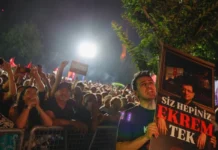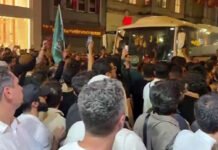Turkey’s state-run Anadolu news agency (AA) has secretly filmed Turkish businessman Akın İpek, one of the targets of the Turkish government led by President Recep Tayyip Erdoğan due to his links to the Gülen movement, in London, apparently violating İpek’s privacy.
The agency released video footage on Friday that shows İpek being secretly filmed around his offices in London and driving his car. In the clip the address of İpek’s offices are shown as well as the license plate of his car.
AA says İpek has three offices one of London’s posh neighborhoods and drives an expensive car that has his initials on its license plate. The agency says İpek lives in luxury in London.
İpek accused the AA of making him an open target by releasing the details of his address on Friday. “This has a reason. Since they cannot enter into a judicial and ethical competition [with me], they want to silence me [this way],” İpek tweeted.
The businessman, who went to the United Kingdom (UK) due to Turkish government pressure on followers of the Gülen movement, did not return to Turkey in the aftermath of a controversial coup attempt on July 15, 2016.
The İpek family members had already been under immense pressure from President Erdoğan and the Justice and Development Party (AKP) government due to their links to the Gülen movement following corruption operations that were conducted on Dec. 17 and 25, 2013 in which Erdoğan’s close circle was implicated.
On Oct. 24, 2015 the government appointed trustees to take over the management of dozens of companies belonging to the İpek family in addition to several media outlets operating under the İpek Media Group, due to their critical stance against the government.
In January 2017 an Ankara court ordered that all assets belonging to the İpek family be transferred to the Savings Deposit Insurance Fund (TMSF) over links to the Gülen movement.
The Turkish government has seized nearly 1,100 companies across Turkey with a total value of $12 billion in assets and transferred them to the Savings Deposit Insurance Fund (TMSF). The companies were mostly targeted as part of the government crackdown on the Gülen movement.
According to a survey conducted by Brussels-based The Arrested Lawyers Initiative in June 2018, the Turkish government has transferred some TL 49,4 billion ($11 billion) in assets of 1,124 companies seized for alleged affiliation with the Gülen movement to a special fund under a crackdown that began following a controversial coup attempt on July 15, 2016.
The survey said that as of June 4, 2018 the TMSF controls 1,124 seized companies and also the personal assets of 127 individuals. Among the companies are Boydak Holding, which has 34 subsidiaries including the Bellona and İstikbal furniture makers and retailers, with 1,240 retail stores. Boydak employs 14,000 people and indirectly creates 110,000 jobs, the survey said.
The other seized major Turkish companies cited in the survey include Koza, Dumankaya, Akfa, Orkide, Sesli and Naksan
Turkey has seized the companies under presidential decrees, and their owners had no judicial recourse. The proprietors are allegedly members of the Gülen movement. Trustees have been appointed to run the companies against their shareholders’ wishes.
The companies are active in all areas of business and trade including investment, mining, petrol distribution, automotive, auto-gas, energy, transportation, food, agriculture, home textiles, furniture, jewellery, pharmaceuticals, law and IT, said the survey.
The value of the assets seized does not include those of 127 individuals, 19 unions, 15 private universities, 49 hospitals, 145 foundations, 174 media outlets, 1,419 foundations and another 2,271 education companies, it said. The total value of all assets confiscated could total TL 100 billion, added the survey.
According to the survey, at the very beginning of a state of emergency (OHAL) declared on July 23, 2016 in the aftermath of the coup bid, 934 private schools, 109 dormitories, 35 hospitals, 15 private universities, 16 unions, 104 foundations and 1,125 associations were dissolved and all their assets including real estate, chattel goods, bank accounts, intellectual property and other financial assets were transferred to the public treasury. As of June 4, at least 4,100 profit-oriented or non-profit legal entities had been dissolved, and their assets were confiscated under decree-laws without any judicial procedure.
Turkey survived a controversial military coup attempt on July 15, 2016 that killed 249 people. Immediately after the putsch, the Justice and Development Party (AKP) government along with President Recep Tayyip Erdoğan pinned the blame on the Gülen movement.
Fethullah Gülen, who inspired the movement, strongly denied having any role in the failed coup and called for an international investigation into it, but President Erdoğan — calling the coup attempt “a gift from God” — and the government initiated a widespread purge aimed at cleansing sympathizers of the movement from within state institutions, dehumanizing its popular figures and putting them in custody.
Turkey has suspended or dismissed more than 150,000 judges, teachers, police and civil servants since July 15. On December 13, 2017 the Justice Ministry announced that 169,013 people have been the subject of legal proceedings on coup charges since the failed coup.
Turkish Interior Minister Süleyman Soylu announced on April 18, 2018 that the Turkish government had jailed 77,081 people between July 15, 2016 and April 11, 2018 over alleged links to the Gülen movement. (SCF with turkishminute.com)















